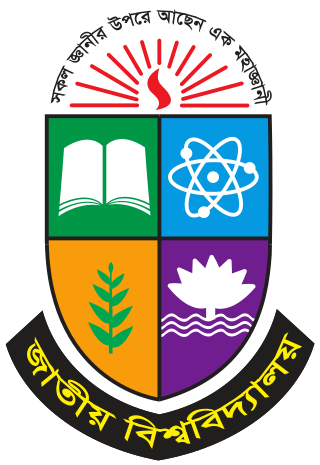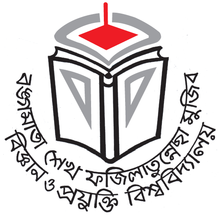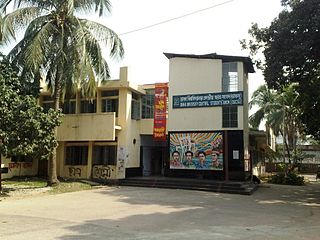
Bangladesh Agricultural University, was established in 1961. It is the first agricultural university, and also the second largest public university of Bangladesh. This university is located in Mymensingh. The university has 44 departments.

The University of Chittagong is a public research university located in Hathazari, Chattogram, Bangladesh. It was established on 18 November 1966. It is one of the oldest universities in Bangladesh. Its 2,312.32 acres (935.76 ha) campus is the largest among universities in Bangladesh. It is one of the four autonomous by the act universities of Bangladesh.
Presidency University, Bangladesh is a private research university with a campus in Gulshan, Dhaka, Bangladesh. Presidency University has Four schools containing eight departments with a strong emphasis on research-based education. The Gulshan campus was established in 2003. More than 3000 students are currently enrolled here. The number of faculty members teaching at the university is nearly 300.

Dhaka University of Engineering & Technology, Gazipur, commonly known as DUET, formerly BIT Dhaka, is a public engineering and technological research university in Gazipur, Bangladesh, which focuses on the study of engineering and architecture. It is one of the top PhD granting research universities of Bangladesh. The university requires diploma engineers candidates, graduated from polytechnic institutes or technical schools affiliated by the Bangladesh Technical Education Board for under-graduation enrollment.

National University is a public collegiate university of Bangladesh that was established in 1992 by an Act of Parliament as an affiliating university of the country to impart graduate and post-graduate level education to the students through its affiliated colleges, schools and professional institutions throughout the country. The number of colleges under the NU is 2,257. Of these, 555 are government colleges. A total of 881 colleges offer honors courses. It is the Second largest university in the world in terms of enrollment. The headquarters is in Gazipur, on the outskirts of Dhaka. After its establishment it affiliated association degree awarding colleges, where many of them were previously affiliated by the University of Dhaka, University of Rajshahi, University of Chittagong and Shahjalal University of Science and Technology.

Noakhali Science and Technology University is a public university in the coastal terrain Noakhali of Bangladesh. It is the 27th public university and fifth science and technology university in Bangladesh. Its foundation stone was laid on 11 October 2003 and academic activities started on 22 June 2006.

The University of Dhaka was established in 1921 as the first university in East Bengal. Following demands from Nawab Sir Khwaja Salimullah Bahadur and others, Viceroy Lord Hardinge proposed on 2 February 1912, that a new university should be established in this partition of Bengal.

The history of Bangladesh (1971–present) refers to the period after the independence of Bangladesh from Pakistan.

Farida Akhtar is an adviser to the 2024 Bangladesh interim government and the executive director of UBINEG. She is also an advisor to the current interim government in its Ministry of Fisheries and Livestock.

The University of Dhaka, also known as Dhaka University or DU, is a public research university located in Dhaka, Bangladesh. Established in 1921, it is the oldest active university in the country.

Bangamata Sheikh Fojilatunnesa Mujib Science & Technology University is a government financed public university of Bangladesh. Proposed new name is Jamalpur Science and Technology University (JSTU) in 2024, August.

Bangabandhu Sheikh Mujibur Rahman Maritime University (BSMRMU) (Bengali: বঙ্গবন্ধু শেখ মুজিবুর রহমান মেরিটাইম বিশ্ববিদ্যালয়) was established in 2013, the 37th public university of the country. It is the first maritime university in Bangladesh, the 3rd maritime university in South Asia and the 12th maritime university in the world. It has issued its first calls for admission in December, 2016. The BSc in Oceanography program was started on 3 January 2017 at the university's temporary campus in Mirpur, as part of the first-ever launch of the Bachelor class in the university. Then in 2018, the first batch of BSc in Naval Architecture and Offshore Engineering classes started. Two more program classes started in 2019. LLB in Maritime Law and BBA in Port Management and Logistics. 2020 BSc in Maritime Fisheries first batch admission and classes start.

Dhaka University Central Students' Union, also known by its acronym DUCSU, is the official students' union of the University of Dhaka. Called the second parliament of Bangladesh, DUCSU represents Dhaka University students in the university's decision-making, acts as the voice for students in the national higher education policy debate, and provides direct services to the student body.

Bangabandhu Sheikh Mujibur Rahman Aviation and Aerospace University is a public university in Bangladesh. It is funded by the government and is Bangladesh's first higher education institution on aerospace engineering. It is the 46th public University of Bangladesh. The permanent campus of BSMRAAU is situated in Lalmonirhat, beside the Lalmonirhat Airport. As per the admission circular the Aeronautical Engineering program began in January 2020.
Muhammad Abdul Hamid is a Bangladeshi economist, researcher, writer and academic. He was third vice chancellor of Islamic University, Bangladesh. He was a professor in the Economics department at Rajshahi University. He directly contributed to the return of IU campus to Shantidanga.
A. N. M. Momtaz Uddin Chowdhury was a Bangladeshi writer and academic. He was the first vice-chancellor (1981–1988) of Islamic University, Bangladesh He also served as project director for establishing Islamic University, Bangladesh. He also played an important role in the establishment of the Islamic University. He also served as the Director General of the Directorate Of Secondary & Higher Education in 1963.
Non-Government Employee Retirement Benefits Board is a Bangladesh government owned board that manages the pensions of non-government teachers along with Non-government Teachers and Employees Welfare Trust.

The Constitutional Reform Commission was established by the Yunus ministry on September 2024 with a purpose to prepare a report on the reasons behind the past constitutional failures and to create a roadmap for holding a constituent assembly election to draft and adopt a new, inclusive, democratic constitution, ensuring the inviolability of human dignity. The commission was formed in the aftermath of a constitutional crisis triggered by the July revolution that culminated in the ousting of Sheikh Hasina on 5 August 2024.

The Students–People's uprising, also known as the July Revolution, was a pro-democratic mass uprising in Bangladesh. It began as a quota reform movement in early June 2024, led by the Anti-discrimination Students Movement, after the Bangladesh Supreme Court invalidated the government's 2018 circular regarding job quotas in the public sector. The movement escalated into a full-fledged mass uprising after the government carried out mass killings of protesters, known as July massacre, by the late of July. By early August, the movement evolved into a non-cooperation movement, ultimately leading to the ouster of the then-Prime Minister, Sheikh Hasina, who fled Bangladesh to India. Hasina's ouster triggered a constitutional crisis, leading to the formation of an interim government led by the country's only Nobel laureate, Muhammad Yunus, as the chief adviser.
Gitiara Nasreen is a professor of the Department of Mass Communication and Journalism at the University of Dhaka.














